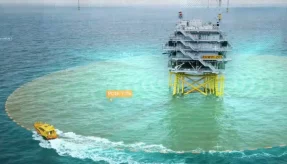
Silicon Microgravity has secured a DASA Defence Innovation Loan to further develop and commercialise their micro-chip technology for autonomous tunnel and bunker detection.
The Defence Innovation Loan will help the Cambridge-based SME develop and commercialise its autonomous gravimeter technology.DASA has also funded Silicon Microgravity’s ultra-precise, gyroscope technology for alternative navigation in GPS denied environments.
DASA’s Defence Innovation Loans, run in partnership with Innovate UK, is an alternative funding model to help convert mature defence innovations into viable business propositions that can compete for defence procurement.
The detection of sub-surface tunnels and bunkers has long been identified as a challenge area for defence, in both asymmetric and symmetrical warfare, and recent conflicts have only highlighted the growing threat of underground structures. In order to better safeguard frontline personnel, the military needs to swiftly and efficiently detect sub-surface tunnels and bunkers to overcome potential adversaries who use them.
Despite their effectiveness, current tunnel detection methods such as ground penetrating radar and electromagnetics have several drawbacks. They are often bulky, costly, and challenging to apply in situations featuring difficult to navigate terrain, making them less efficient for quick, mobile use.
Silicon Microgravity identified the need to radically shrink, and lower the cost and power consumption of underground structure detection systems, to enhance their effectiveness for Defence. Drawing inspiration from the civil environment and the current use of conducting gravity surveys to detect buried infrastructure, the SME sought to adapt this technology for defence.
Silicon Microgravity is developing a gravimeter (a tool for measuring minute changes in the force of gravity) which can be deployed remotely on an autonomous land vehicle or drones, to detect underground structures, keeping personnel out of danger zones.
The innovation uses resonant Micro Electrical Mechanical Systems (MEMS), which is a technological process used to create tiny integrated devices or systems that combine mechanical and electrical components. MEMS has a long history in the civil world, and is used in an array of technologies such as accelerometers for airbag sensors and inkjet printer heads, however it has never had, until now, the sensitivity for use in navigation or gravity applications. Silicon Microgravity’s sensors are over a thousand times more accurate than those traditionally used in civilian applications.
Francis Neill, CEO of Silicon Microgravity, said: “DASA have been absolutely fundamental in helping to get Silicon Microgravity to the stage where we will shortly be commercialising what is becoming recognised as world leading technology in gravity sensing and inertial navigation. Not only does our technology have defence applications but it is very much in line with the UK’s strategy of creating an international technology superpower. DASA have provided both market and fund raising assistance in addition the project specific funding.”
Learn more about Defence Innovation Loans here and submit an application.
If you would like to join our community and read more articles like this then please click here








